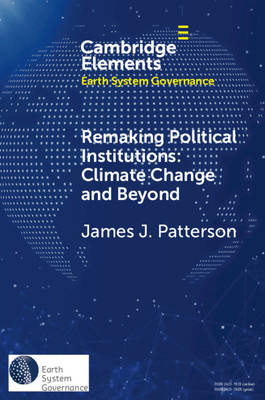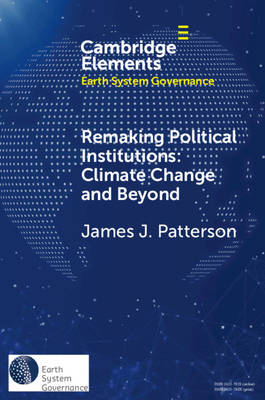
- Afhalen na 1 uur in een winkel met voorraad
- Gratis thuislevering in België vanaf € 30
- Ruim aanbod met 7 miljoen producten
- Afhalen na 1 uur in een winkel met voorraad
- Gratis thuislevering in België vanaf € 30
- Ruim aanbod met 7 miljoen producten
Zoeken
Omschrijving
Institutions are failing in many areas of contemporary politics, not least of which concerns climate change. However, remedying such problems is not straightforward. Pursuing institutional improvement is an intensely political process, playing out over extended timeframes, and intricately tied to existing setups. Such activities are open-ended, and outcomes are often provisional and indeterminate. The question of institutional improvement, therefore, centers on understanding how institutions are (re)made within complex settings. This Element develops an original analytical foundation for studying institutional remaking and its political dynamics. It explains how institutional remaking can be observed and provides a typology comprising five areas of institutional production involved in institutional remaking (Novelty, Uptake, Dismantling, Stability, Interplay). This opens up a new research agenda on the politics of responding to institutional breakdown, and brings sustainability scholarship into closer dialogue with scholarship on processes of institutional change and development. Also available as Open Access on Cambridge Core.
Specificaties
Betrokkenen
- Auteur(s):
- Uitgeverij:
Inhoud
- Aantal bladzijden:
- 75
- Taal:
- Engels
- Reeks:
Eigenschappen
- Productcode (EAN):
- 9781108708425
- Verschijningsdatum:
- 4/02/2021
- Uitvoering:
- Paperback
- Formaat:
- Trade paperback (VS)
- Afmetingen:
- 152 mm x 229 mm
- Gewicht:
- 140 g

Alleen bij Standaard Boekhandel
+ 63 punten op je klantenkaart van Standaard Boekhandel
Beoordelingen
We publiceren alleen reviews die voldoen aan de voorwaarden voor reviews. Bekijk onze voorwaarden voor reviews.











